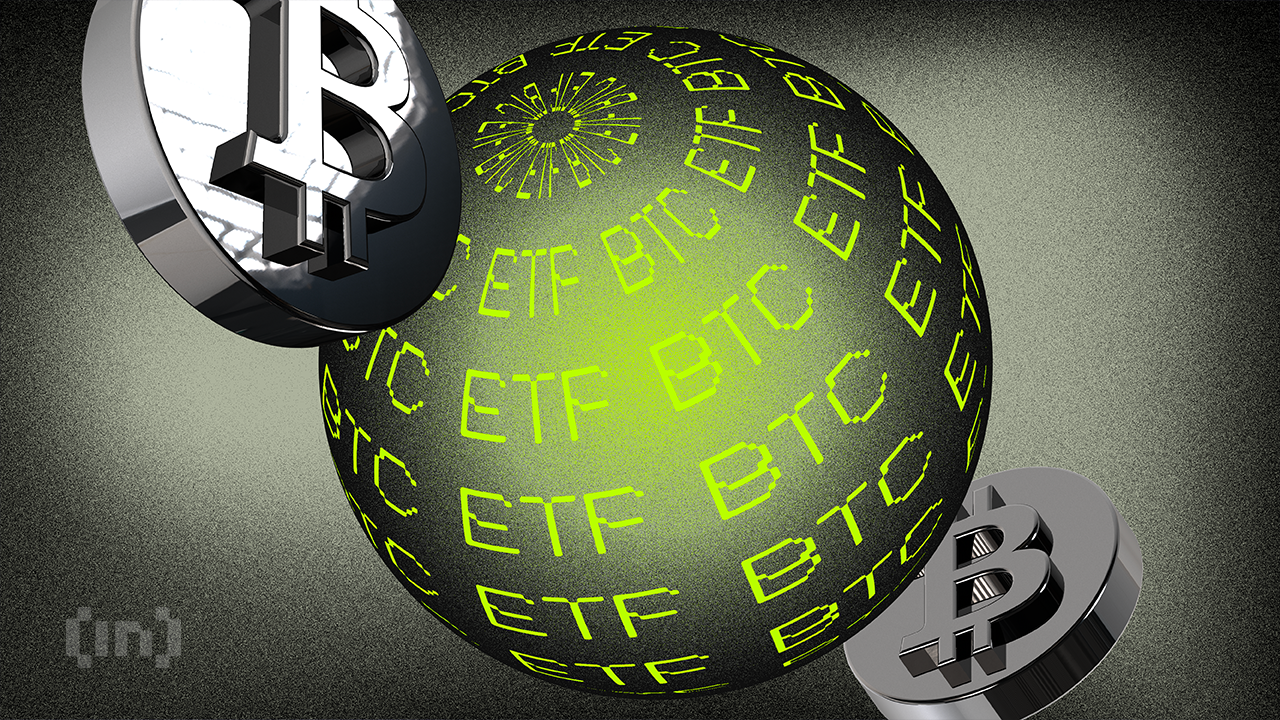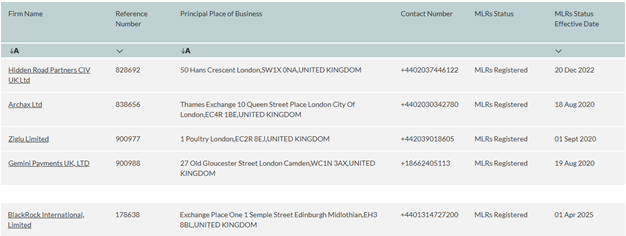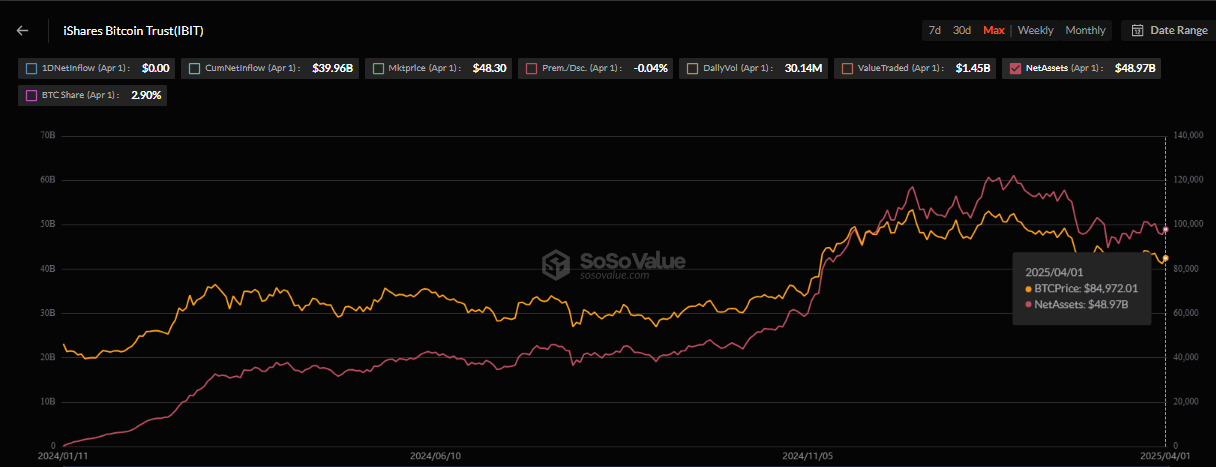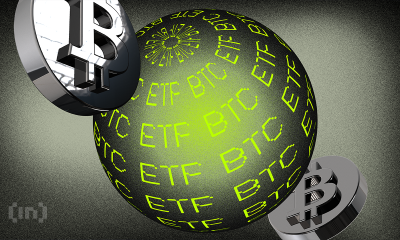Bitcoin
Germany Shakes Up Crypto Market With Fresh 1,500 Bitcoin Move

The crypto world is grappling with a million-dollar question – what is the German government doing with its massive Bitcoin holdings? According to data by Lookonchain, the recent transfer of 1,500 BTC, valued at roughly $95 million, has sparked a frenzy of speculation, with seasoned investors both worried and intrigued.
The Looming Shadow Of A Crypto Price Crash
Seasoned crypto veterans are haunted by the specter of a government fire sale. Memories of June’s $195 million transfer by the German government, which triggered a 3.5% price dip for Bitcoin, cast a long shadow.
Analysts like Vijay Pravin, CEO of BitsCrunch, warn of a “more pronounced downturn” if large-scale disposals occur. The fear is that a flood of Bitcoin hitting the market could overwhelm buyers, driving down the price.
The German Government transferred 1,500 $BTC($94.7M) out again in the past 20 minutes, of which 400 $BTC($25.3M) was transferred to #Bitstamp, #Coinbase and #Kraken.
German Government currently holds 44,692 $BTC($2.82B).https://t.co/6V5KFoyQa7 pic.twitter.com/35yMQIcMA8
— Lookonchain (@lookonchain) July 1, 2024
Beyond The Sell-Off: Unveiling The German Endgame
While a government-induced price correction is a major concern, some experts posit a more nuanced motive behind the transfer. The move could be part of a portfolio rebalancing act. Governments, like any investor, need to diversify their holdings to mitigate risk. Shifting some Bitcoin to other assets could be a way to achieve a more balanced portfolio.
Another possibility is that this is a prelude to future trades. The German government may be planning to buy or sell Bitcoin at a later date, and this transfer could be a preparatory move to position their holdings on exchanges. This strategy hinges on them anticipating future price movements, which is inherently risky.
As of today, the market cap of cryptocurrencies stood at $2.2 trillion. Chart: TradingView.com
A third intriguing theory suggests this might be a test of market liquidity. By dipping their toes into the exchange pool with a small transfer, the German government could be gauging the market’s ability to absorb a larger sale in the future. This would be a calculated move to minimize potential price disruptions from any future Bitcoin disposals.
Germany’s Massive Bitcoin Holdings
The German government’s actions highlight the growing influence of institutional players in the crypto market. According to figures from the onchain analysis platform Arkham Intelligence, Germany’s Bitcoin holdings is currently valued at a staggering $2.82 billion.
This showcases their increasing involvement in this dynamic space. Their decisions, whether selling, buying, or simply rebalancing, have the potential to significantly impact market trends.
Bitcoin In The Green
Despite the jitters caused by the German transfer, Bitcoin’s overall outlook remains positive. The leading cryptocurrency is currently trading at a healthy $62,947, with a market capitalization exceeding $1.24 trillion.

Featured image from Plisio, chart from TradingView
Bitcoin
Why Recency Bias Is Amplifying Fear Around Bitcoin’s Price

The Crypto Fear and Greed Index dropped to 25 yesterday, signaling “Extreme Fear” in the cryptocurrency market. Yet, an analyst suggests that the current panic might be exaggerated, largely driven by recency bias.
This comes as Bitcoin is navigating market volatility triggered by broader macroeconomic conditions. The leading cryptocurrency has fallen 11.4% year to date, reflecting the wider sentiment of fear and uncertainty.
Is the Recency Bias Inflating Fear Around Bitcoin’s Price?
In the latest X (formerly Twitter) post, analyst Lark Davis highlighted an interesting trend in the Crypto Fear and Greed Index. This sentiment gauge measures market emotions from 0 (Extreme Fear) to 100 (Extreme Greed).
On April 3, it plummeted to a low of 25, indicating heightened anxiety among investors, even though Bitcoin was trading around $80,000. In fact, the latest value of 28 also indicated substantial fear among market participants.

Nonetheless, according to Davis, the sentiment was out of place, given Bitcoin’s price performance. He noted that the index’s decline contrasted with market conditions six months prior. Despite Bitcoin trading at $65,000, the index showed a neutral reading then.
“This is what’s called “recency bias,” and you can leverage it,” he wrote.
For context, recency bias refers to the tendency of investors or traders to give more weight to recent events or information when making decisions while disregarding longer-term trends or data. This psychological bias often leads to overreaction to short-term market movements, such as a sudden price spike or a crash.
“So that’s why we’re seeing higher fear readings at today’s $80,000, than yesterday’s $65,000,” David remarked.
He suggested that the fear seen in the market is not entirely justified and that reactions to short-term fluctuations are often more extreme than necessary.
This coincides with Bitcoin continuing to see fluctuations amid President Trump’s tariff plans and fears of a potential recession. While it remains relatively steady compared to traditional markets, the decline in Bitcoin’s value has still raised doubts about its stability and long-term potential.
Notably, Michael Saylor, chairman of Strategy (formerly MicroStrategy), highlighted that short-term volatility doesn’t reflect Bitcoin’s long-term potential.
“Bitcoin is most volatile because it is most useful,” he said.
Saylor explained that Bitcoin’s volatility is largely due to its liquidity and 24/7 availability, Which means it is more susceptible to rapid sell-offs during market panics. However, Saylor reiterated that while Bitcoin behaves like a risk asset in the short term, its long-term value is unaffected by these fluctuations, reinforcing its role as a store of value.
Meanwhile, Arthur Hayes, the former CEO of BitMEX, provided another perspective on the ongoing market conditions.
“Some of y’all are running scurred, but I love tariffs,” Hayes stated.
According to Hayes, global economic imbalances will eventually be corrected. While short-term market pain is inevitable, Hayes predicts that the solution will likely involve printing more money, which he views as beneficial for Bitcoin.
“The $ is weakening alongside foreigners selling US tech stocks and bringing money home. This is good for BTC and gold over medium term,” he forecasted.
His comments align with BeInCrypto’s recent report on the inverse correlation between the US Dollar Index (DXY) and BTC. Thus, a decline in the former could benefit the latter.

For now, Bitcoin continues to see modest losses. Over the past week, it has declined by 4.5%. Meanwhile, the coin has shed 1.0% of its value over the past day. At the time of writing, Bitcoin was trading at $82,855.
Disclaimer
In adherence to the Trust Project guidelines, BeInCrypto is committed to unbiased, transparent reporting. This news article aims to provide accurate, timely information. However, readers are advised to verify facts independently and consult with a professional before making any decisions based on this content. Please note that our Terms and Conditions, Privacy Policy, and Disclaimers have been updated.
Bitcoin
Why ETF Issuers are Buying Bitcoin Despite Recession Fears

According to new data from Arkham Intelligence, three major Bitcoin ETF issuers are acquiring huge amounts of BTC today. The ETFs had $220 million in net inflows yesterday, and the issuers are potentially expecting a spike in demand.
Although Bitcoin has seen wild fluctuations over the past couple of days, institutional investors might show more confidence in the leading cryptocurrency than the TradFi market.
Why are ETF Issuers Buying Bitcoin?
The crypto market experienced wider liquidations today, and fears of a broader recession are circulating heavily. Since President Trump imposed much higher tariffs than expected, crypto is mirroring the TradFi stock market with notable downturns.
However, the US spot Bitcoin ETFs market shows that institutional demand might rebound in the short term.
“Donald Trump just tariffed the entire world. So? Grayscale is buying Bitcoin, Fidelity is buying Bitcoin, Ark Invest is buying Bitcoin,” Arkham Intelligence noted on social media.
Arkham Intelligence, a prominent blockchain analysis platform, is not the only one noticing this trend in Bitcoin ETFs. Although Bitcoin’s price has been very volatile over the last two days, it has consistently managed to return to a rough baseline.
The asset’s long-short ratio was 0.94 last week, and it shifted to 1 today. This signals a move toward more balanced investor positioning.
Previously, with 48.5% long positions against 51.5% short positions, the market exhibited a slight bearish tilt. Today, the equal split—with 50.5% long positions—signals that investors have neutralized their stance, reducing the bearish bias.

This balanced positioning suggests that market sentiment has stabilized, potentially reflecting increased uncertainty about near-term price movements. Bitcoin investors may now be awaiting clearer market signals before committing to a more directional bias.
Additionally, the Bitcoin ETFs have performed well in another key area. According to data from SoSo Value, the entire asset category had net inflows of $220 million yesterday.
Granted, Trump made his Liberation Day announcements after the stock market closed yesterday, but that’s still a very impressive amount of growth.
It is currently unclear exactly what impact today’s market turmoil had on the Bitcoin ETFs as an asset category. However, Arkham’s data suggests that these issuers are making notable investments in BTC.
If nothing else, it suggests that these firms are anticipating an uptick in demand in the near future. There are still many unanswered questions about tariffs, crypto markets, and the global economy as a whole.
If ETF inflows continue throughout this week, it will reflect institutional investors’ betting on BTC to remain more stable and sustainable than TradFi markets amid recession concerns.
Disclaimer
In adherence to the Trust Project guidelines, BeInCrypto is committed to unbiased, transparent reporting. This news article aims to provide accurate, timely information. However, readers are advised to verify facts independently and consult with a professional before making any decisions based on this content. Please note that our Terms and Conditions, Privacy Policy, and Disclaimers have been updated.
Bitcoin
BlackRock Approved by FCA to Operate as UK Crypto Asset Firm

BlackRock, the world’s largest asset manager, received approval from the UK’s Financial Conduct Authority (FCA) to operate as a crypto asset firm.
This marks a significant milestone for the investment giant, allowing it to extend its influence in the growing digital asset market.
BlackRock Joins Crypto Elite with FCA Approval in the UK
With this approval, BlackRock can operate its newly launched European Bitcoin exchange-traded product (ETP) as a UK entity.
According to the FCA’s website, BlackRock officially became the 51st company registered as a crypto asset firm on April 1, 2025. The firm joins a select group of financial entities, including Coinbase, PayPal, and Revolut, which have met the FCA’s stringent regulatory requirements.

BlackRock’s iShares Bitcoin ETP recently launched on the Euronext stock exchanges in Paris and Amsterdam. As BeInCrypto reported, this marked an expansion of the firm’s footprint in the European crypto investment market.
To attract investors, the product was introduced with a temporary fee waiver. It reduced its expense ratio to 0.15% until the end of the year. Once the waiver expires, the fee will revert to 0.25%, aligning with competing products like CoinShares’ Bitcoin ETP.
The iShares Bitcoin ETP is designed for institutional and informed retail investors. It offers a regulated and cost-effective way to gain exposure to Bitcoin. This move also positions BlackRock as a leader in the European digital asset space, catering to the growing demand for crypto-based financial products.
Meanwhile, the FCA has faced criticism for its cautious approach to crypto regulation. It has only approved around 9% of all applicants seeking registration as crypto asset firms.
“This low level of application approval signifies potential concern for the UK’s ambition to become a crypto hub,” Alan Vey, founder of web3 firm Aventus and a former Brevan Howard developer, said recently.
The regulator has defended its strict policies. A statement on its website articulated that many submissions lack essential information or fail to meet compliance standards.
“We have rejected submissions that didn’t include key components necessary for us to carry out an assessment, or the poor quality of key components meant the submission was invalid,” the FCA wrote.
Therefore, BlackRock’s FCA approval is not a mean feat. It marks another step in the mainstream adoption of crypto. With the UK now part of BlackRock’s growing crypto asset operations, the firm continues to push forward in integrating Bitcoin into traditional finance (TradFi).
BlackRock also manages approximately $12 trillion in assets (AUM) and continues actively expanding its crypto market presence. It launched its iShares Bitcoin Trust (IBIT) in the US in January 2024. The financial instrument has since grown into the largest US spot Bitcoin ETF, managing nearly $49 billion in assets.

Moreover, the surge in institutional interest in Bitcoin ETFs has been remarkable. In just one year, US spot Bitcoin ETFs have attracted over $95 billion in investments, SoSoValue data shows. This highlights the increasing demand for regulated Bitcoin investment vehicles.
Disclaimer
In adherence to the Trust Project guidelines, BeInCrypto is committed to unbiased, transparent reporting. This news article aims to provide accurate, timely information. However, readers are advised to verify facts independently and consult with a professional before making any decisions based on this content. Please note that our Terms and Conditions, Privacy Policy, and Disclaimers have been updated.
-

 Market20 hours ago
Market20 hours agoIP Token Price Surges, but Weak Demand Hints at Reversal
-

 Market23 hours ago
Market23 hours agoEthereum Price Recovery Stalls—Bears Keep Price Below $2K
-

 Market16 hours ago
Market16 hours agoBitcoin’s Future After Trump Tariffs
-

 Altcoin21 hours ago
Altcoin21 hours agoBinance Issues Key Announcement On StakeStone TGE; Here’s All
-

 Altcoin20 hours ago
Altcoin20 hours agoMovimiento millonario de Solana, SOLX es la mejor opción
-

 Ethereum20 hours ago
Ethereum20 hours agoEthereum Trading In ‘No Man’s Land’, Breakout A ‘Matter Of Time’?
-

 Bitcoin20 hours ago
Bitcoin20 hours agoBlackRock Approved by FCA to Operate as UK Crypto Asset Firm
-

 Altcoin19 hours ago
Altcoin19 hours agoJohn Squire Says XRP Could Spark A Wave of Early Retirements






















